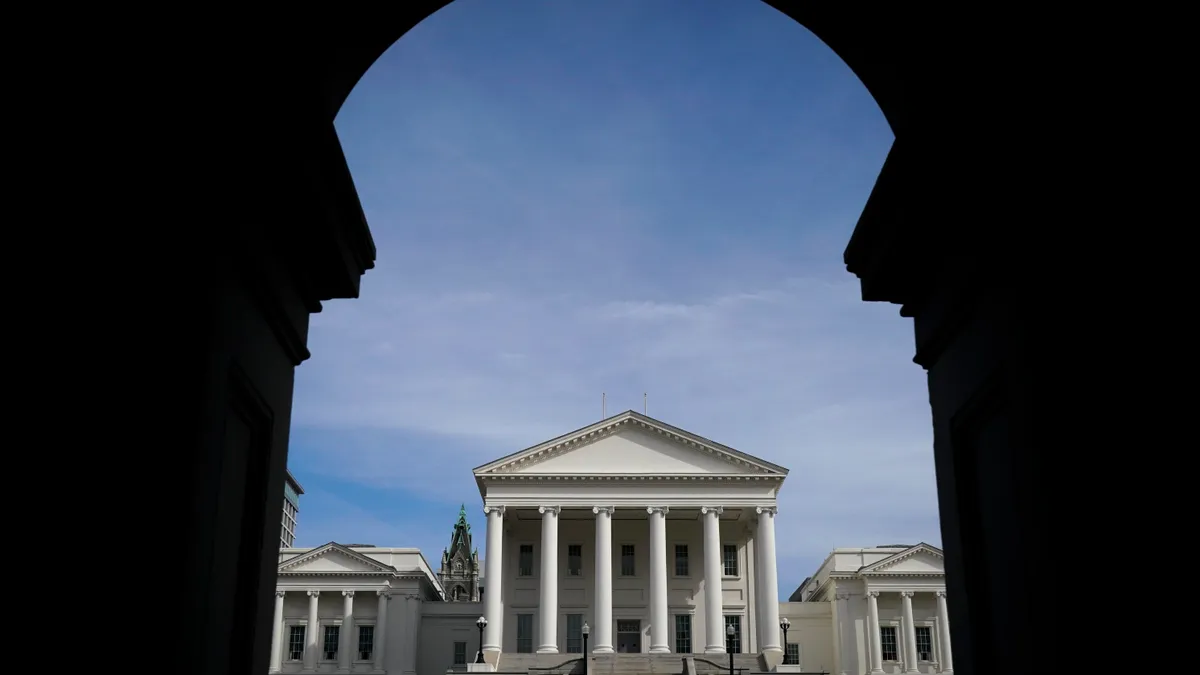Dive Brief:
- Legislation proposed in Virginia with the aim of increasing the amount of third-party generating capacity in Dominion Energy and Appalachian Power’s service areas in the state has been tabled in the House and continued to the next session in the Senate.
- Clean energy groups lobbying for the bill were not able to reach an agreement with the utilities on certain aspects — in particular, a provision to mandate the expansion of distributed generation capacity in Virginia.
- Advanced Energy United’s Eastern Director Kim Jemaine, who led discussions with Dominion, said the negotiations were “quite frustrating.” Dominion Media Relations Manager Aaron Ruby said the utility had “significant concerns” about the legislation that couldn’t be reconciled.
Dive Insight:
“In particular, we were concerned about the infeasibility and cost of increasing the distributed solar carve-out. This would have added hundreds of millions of dollars a year in new costs onto our customers,” Ruby said in an email. “We worked with a number of stakeholders over many weeks to address these concerns, but were unable to reach an agreement.”
Jemaine said she believed Dominion to be negotiating in “bad faith,” and that the utility had failed to supply documentation to support concerns it raised to her about aspects of the bill including the distributed generation carve-out. The carve-out would mandate Dominion use distributed generation to meet 5% of its annual renewable portfolio standard requirements, an increase from the current 1% mandate.
“According to them, they were having difficulties meeting the 1% target, and were obviously concerned about expanding that target. So we looked at compliance filings and found that for the last two [filings], they did not have any difficulty meeting that target and did not have to make any deficiency payments,” she said.
Jemaine said the negotiators asked Dominion to provide them with its assessment of the state’s distributed generation market, as well as the utility calculations associated with its estimates of hundreds of millions in potential deficiency payments that it said would result from the carve-out, but had yet to receive that information.
Ruby did not provide the associated assessments upon request from Utility Dive, but said Dominion’s “core mission is providing reliable, affordable and increasingly clean energy to our customers …. [which] guides our thinking on all major public policy issues.”
“We look forward to continuing the dialogue,” he said in reference to the legislation.
The House of Delegates version, HB638, was tabled by unanimous vote on Feb. 8. On Feb. 5, the Senate version, SB230, was continued to the 2025 session by a unanimous vote in the Commerce and Labor committee.
When the bill is taken up again, it will be considered by the legislature’s Commission on Electric Utility Regulation. Jemaine and Southern Environmental Law Center attorney Josephus Allmond, who also worked on negotiating the legislation, said they hope that venue will provide an opportunity for the bill to stand on its merits.
The bill was sent to that commission “amid concerns that the changes we were making were consequential ones that deserved more than a ten minute hearing,” said Allmond. “We're actually excited about continuing to make our case there that there's plenty of renewable energy certificates available out there for distributed projects.”
Allmond said that he thinks once the bill has been reviewed by the commission, it can return to the Senate in a form that “everyone feels more comfortable with.”
Jemaine said that the bill’s advocates “have all of the data to show that the [distributed generation] carve-out is primed for expansion,” and she hopes that the commission “is a place where we can discuss this issue further and make our argument.”
“I think we have all the information on our side, it's just about whether or not that commission is actually used as an offseason space to further energy legislation,” she said. “Obviously, the downside is that that may not come to fruition, and it’s just a place where bills go to die. And I hope that's not the case.”














